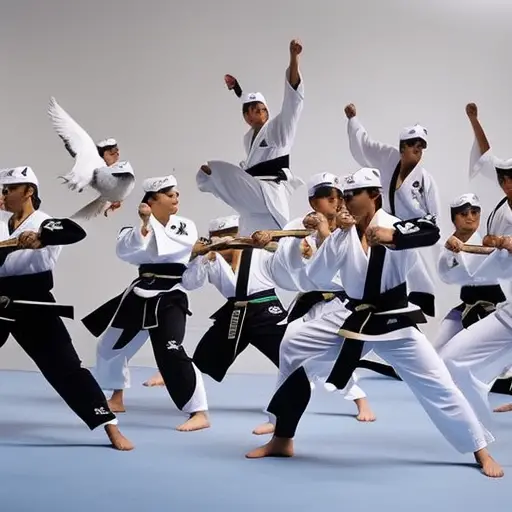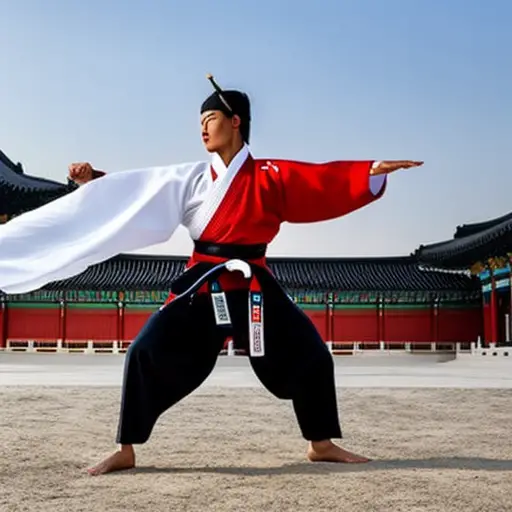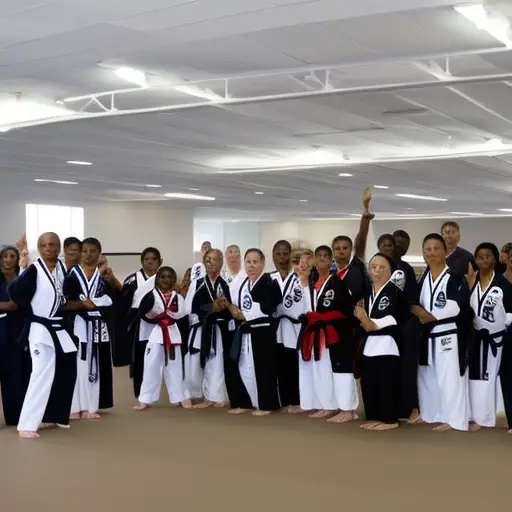The Ethical Dimensions of Taekwondo Practice

According to a recent survey, 85% of practitioners believe that ethics play a crucial role in taekwondo practice.
As a discipline rooted in honor and respect, taekwondo holds practitioners to a high ethical standard both inside and outside the dojang.
This article explores the ethical dimensions of taekwondo practice, delving into the importance of integrity, humility, and compassion.
It also examines the process of ethical decision making and the application of taekwondo ethics beyond the training environment.
The Importance of Integrity in Taekwondo Practice
In the realm of Taekwondo practice, the importance of integrity cannot be overstated. Taekwondo is not simply a martial art; it is a way of life that emphasizes discipline, respect, sportsmanship, and fair play. These values are deeply ingrained in the ethical framework of Taekwondo, and practitioners are expected to uphold them at all times.
Discipline and respect are fundamental aspects of Taekwondo practice. Practitioners are required to follow a strict code of conduct, which includes adherence to rules and regulations, punctuality, and respect for instructors and fellow practitioners. Discipline is essential for honing physical and mental skills, as well as fostering self-control and self-discipline.
Sportsmanship and fair play are also crucial in taekwondo ethics. Taekwondo is not about defeating or overpowering opponents; it is about personal growth, self-improvement, and mutual respect. Practitioners are encouraged to compete with integrity, displaying good sportsmanship and treating opponents with fairness and respect. This promotes a healthy competitive environment and contributes to the overall development of the individual.
Cultivating Humility in the Taekwondo Community
One key aspect to consider when discussing the cultivation of humility in the Taekwondo community is the importance of recognizing and embracing one’s limitations. Fostering sportsmanship in Taekwondo is crucial in developing humility within practitioners. Sportsmanship encourages respect for opponents, fair play, and graciousness in both victory and defeat. By exhibiting good sportsmanship, Taekwondo practitioners learn to recognize that they are part of a larger community and that their actions impact not only themselves but also others.
Developing self-awareness is another essential element in cultivating humility. Taekwondo practitioners must have a deep understanding of their own strengths and weaknesses. This self-awareness allows them to acknowledge and accept their limitations without feeling inferior or inadequate. It also helps them to appreciate the skills and abilities of others, fostering a sense of humility in their practice.
Furthermore, humility in the Taekwondo community can be nurtured through regular self-reflection and evaluation. Practitioners can engage in introspection to identify areas of improvement and set realistic goals for personal growth. This process encourages humility by emphasizing the continuous pursuit of learning and development, rather than focusing solely on achieving high ranks or winning competitions.
The Role of Compassion in Taekwondo Ethics
Furthermore, cultivating compassion in Taekwondo ethics involves recognizing the interconnectedness of all beings and embracing a mindset of empathy and kindness. Compassion and discipline go hand in hand in the practice of Taekwondo. While discipline is essential for achieving mastery of the physical aspects of the martial art, compassion brings a deeper level of understanding and connection to the practice.
Compassion in Taekwondo ethics extends beyond the training mat and into everyday life. It is about treating others with respect, kindness, and empathy, both inside and outside of the dojang. In the context of sportsmanship, compassion allows practitioners to understand and appreciate the efforts and struggles of their opponents. It fosters a sense of fairness and humility, ensuring that victories are celebrated with grace and losses are accepted with dignity.
Moreover, compassion in Taekwondo ethics plays a crucial role in building a supportive and inclusive community. By recognizing the interconnectedness of all beings, practitioners learn to value and appreciate the diversity within the Taekwondo community. This mindset of compassion creates an environment where everyone feels welcome and supported, regardless of their background or skill level.
In the subsequent section about ethical decision making in Taekwondo training, it is important to consider how compassion can guide practitioners in making choices that align with their moral values and the principles of Taekwondo.
Ethical Decision Making in Taekwondo Training
Practitioners of Taekwondo frequently encounter situations in their training where ethical decision making is essential to uphold the principles and values of the martial art. These situations often present moral dilemmas that require careful consideration and adherence to ethical principles.
Ethical decision making in Taekwondo training involves evaluating the potential consequences of actions and choosing the course of action that aligns with the ethical principles of the martial art. One of the fundamental ethical principles in Taekwondo is respect for oneself and others. This principle requires practitioners to treat their training partners with fairness, dignity, and courtesy. In situations where a practitioner may be tempted to use excessive force or engage in unsportsmanlike behavior, ethical decision making demands that they exercise self-control and show respect towards their opponents.
Another important ethical principle in Taekwondo is integrity. This principle emphasizes honesty, trustworthiness, and adherence to moral values. Ethical decision making in Taekwondo training requires practitioners to act with integrity, even in the face of difficult situations. For example, if a practitioner observes cheating or unethical behavior during a training session or competition, they are ethically obligated to report it and uphold the integrity of the martial art.
Applying Taekwondo Ethics Beyond the Dojang
The application of Taekwondo ethics beyond the dojang encompasses the integration of moral principles and values into various aspects of practitioners’ lives. Taekwondo practitioners are encouraged to embody ethical leadership and apply the values they learn in the dojang to their interactions with others outside of training sessions. This includes promoting fairness, justice, and equality in their communities.
Applying Taekwondo ethics beyond the dojang can have a positive impact on society, contributing to social justice efforts. Taekwondo teaches practitioners to respect others, regardless of their background or abilities. By embracing these principles, practitioners can become advocates for equal rights and opportunities for all.
Furthermore, Taekwondo ethics can inspire practitioners to take a stand against injustice and oppression. They can use their skills and influence to support causes that promote social justice and work towards creating a more inclusive and equitable society. Taekwondo practitioners can become role models and agents of change, using their platform to address societal issues and inspire others to take action.
Frequently Asked Questions
How Does the Practice of Taekwondo Contribute to Personal Growth and Character Development?
The practice of Taekwondo contributes to personal growth and character development by fostering discipline, perseverance, and self-control. It instills moral values such as respect, integrity, and humility, which are essential for individuals to lead ethical and virtuous lives.
What Are Some Common Ethical Dilemmas That Taekwondo Practitioners May Encounter in Their Training?
Ethical decision making and moral conflicts are inherent in any practice, including Taekwondo. Practitioners may face dilemmas such as fairness in competition, respect for opponents, and integrity in upholding the principles of the martial art.
How Can Taekwondo Instructors Promote a Culture of Integrity and Ethical Behavior Among Their Students?
To promote a culture of integrity and ethical behavior among taekwondo students, instructors can employ various strategies and practical approaches. However, they may face challenges in effectively incorporating ethical values into training.
Are There Any Specific Ethical Guidelines or Principles That Taekwondo Practitioners Are Expected to Follow Outside of the Dojang?
Taekwondo practitioners are expected to adhere to ethical expectations and moral principles outside of the dojang. These guidelines may include promoting respect, honesty, and self-control, while discouraging aggression, dishonesty, and misuse of skills.
How Does the Practice of Taekwondo Foster Empathy and Compassion Towards Others?
The practice of taekwondo fosters empathy and compassion towards others by emphasizing the importance of respect and building strong relationships. Through disciplined training and ethical principles, practitioners develop a deep understanding and appreciation for the well-being of others.
Conclusion
In conclusion, the ethical dimensions of Taekwondo practice encompass the values of integrity, humility, compassion, and ethical decision-making. These principles extend beyond the training space, guiding practitioners to lead honorable lives.
Taekwondo teaches us to uphold our values, to embrace our vulnerabilities, and to show kindness to others. By applying these ethics beyond the Dojang, we can create a world where respect, empathy, and integrity prevail.
Let us strive to embody these values in all aspects of our lives, fostering a more harmonious and compassionate society.





